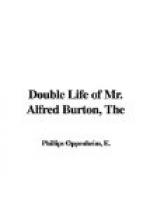“Don’t you think,” Burton suggested doubtfully, “that there might be an opening in the profession for an auctioneer who told the truth?”
Mr. Waddington smiled sadly.
“That’s absurd, Burton,” he replied, “and you know it.”
Burton considered the subject thoughtfully.
“There must be occupations,” he murmured, “where instinctive truthfulness would be an advantage.”
“I can’t think of one,” Mr. Waddington answered, gloomily. “Besides, I am too old for anything absolutely new.”
“How on earth did you succeed in letting Idlemay House?” Burton asked suddenly.
“Most remarkable incident,” his host declared. “Reminds me of my last two sales of antique furniture. This man—a Mr. Forrester—came to me with his wife, very keen to take a house in that precise neighborhood. I asked him the lowest rent to start with, and I told him that the late owner had died of typhoid there, and that the drains had practically not been touched since.”
“And yet he took it?”
“Took it within twenty-four hours,” Mr. Waddington continued. “He seemed to like the way I put it to him, and instead of being scared he went to an expert in drains, who advised him that there was only quite a small thing wrong. He’s doing up some of the rooms and moving in in a fortnight.”
“This sounds as though there might be an opening for an honest house-agent,” Burton suggested.
Mr. Waddington looked dubious.
“It’s never been tried. Just this once it came off, but as a regular thing I should have no confidence in it. People like to be gulled. They’ve been brought up to it. They ask for lies—that’s why the world’s so full of them. Case of supply and demand, you know.”
“According to you, then,” Burton remarked, a little dolefully, “it seems as though this change in us unfits us for any sort of practical life.”
Mr. Waddington coughed. Even his cough was no longer strident.
“That,” he confessed, “has been worrying me. I find it hard to see the matter differently. If one might venture upon a somewhat personal question, how did you manage to discover a vocation? You seem to be prospering,” he added, glancing at his companion’s neat clothes and gray silk tie.
“I was fortunate,” Burton admitted frankly. “I discovered quite by accident the one form in which it is possible to palm off the truth on an unsuspecting public.”
Mr. Waddington laid down his knife and fork. He was intensely interested.
“Art,” Burton murmured softly.
“Art?” Mr. Waddington echoed under his breath, a little vaguely. The questioning gleam was still in his eyes.
“Painting, sculpture, in my case writing,” Burton explained. “I read something when I was half starving which was in a newspaper and had obviously been paid for, and I saw at once that the only point about it was that the man had put down what he saw instead of what he thought he saw. I tried the same thing, and up to the present, at any rate, it seems to go quite Well.”




